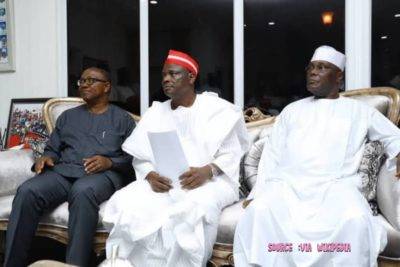In what seems to be a prelude to the 2027 presidential race, political heavyweights Atiku Abubakar and Peter Obi are reportedly mulling over their ambitions for the coveted seat. However, their aspirations are entangled in the complexities of merging opposition parties, presenting a slew of challenges that threaten to derail their plans.
One significant hurdle facing the proposed merger is the reluctance of both parties’ leadership and key stakeholders to fully endorse the integration of their respective organizations. Despite initial discussions, consensus remains elusive on crucial matters such as party structures and leadership roles within the merged entity. This lack of unity within the opposition camp could undermine its effectiveness in challenging the incumbent party’s dominance in the upcoming election.
Furthermore, the absence of a mutually agreed-upon official title for the merged political entity adds another layer of complexity to the merger process. The inability to settle on a cohesive identity not only delays the registration process but also reflects underlying disagreements among the parties involved. With time ticking away, resolving these internal conflicts and presenting a unified front becomes imperative for the opposition to stand a fighting chance in the political arena.
Registration Roadblock: INEC Requirements Stall Merger Progress
As Atiku Abubakar and Peter Obi navigate the intricate maze of political alliances, another obstacle looms large in the form of bureaucratic procedures set forth by the Independent National Electoral Commission (INEC). For the merger to materialize, all participating parties must submit their registration certificates to INEC, initiating the process of forming a new mega party.
However, the delay in obtaining full approval from the respective party bodies complicates matters, as it hampers the timely submission of necessary documents to INEC. Without the required paperwork in place, the registration process remains at a standstill, thwarting any hopes of expediting the merger and forging a formidable opposition force.
The stringent regulations imposed by INEC underscore the need for swift action and meticulous planning on the part of the opposition leaders. Failure to meet the commission’s requirements within the stipulated timeframe not only prolongs the merger process but also exposes the nascent coalition to potential legal challenges and uncertainties.
Navigating Uncertain Waters: Path Forward for Opposition Merger lead by As Atiku Abubakar and Peter Obi
As Atiku Abubakar and Peter Obi grapple with the complexities of merging opposition parties, charting a clear path forward becomes imperative to realize their shared vision of unseating the incumbent administration in 2027. To surmount the challenges ahead, concerted efforts must be made to bridge the existing divides and foster unity among disparate factions within the opposition camp.
Critical to this endeavor is the need for transparent communication and inclusive decision-making processes that accommodate the concerns and aspirations of all stakeholders involved. By prioritizing dialogue and consensus-building, Atiku Abubakar and Obi can lay the groundwork for a cohesive coalition that is resilient in the face of external pressures and internal discord.
Moreover, expediting the registration process with INEC necessitates proactive engagement with regulatory authorities and adherence to prescribed guidelines to ensure compliance. Timely resolution of administrative hurdles will not only streamline the merger process but also instill confidence among supporters and the electorate at large.
In the face of mounting challenges, the success of the proposed merger ultimately hinges on the ability of Atiku Abubakar, Peter Obi, and other opposition leaders to navigate the intricate political landscape with tact and foresight. Only through unity, strategic planning, and unwavering determination can they hope to realize their collective goal of ushering in a new era of governance in Nigeria.
Opposition Leaders and Party Merger Prospects
Former presidential candidates Atiku Abubakar advocating for a merger face scrutiny regarding their ability to garner support from within their respective parties. The success of such a merger hinges on the cooperation of party members, without which the endeavor is likely to fail. The contention arises from the necessity of involving entire party leadership in the merger process to ensure unanimity in decision-making. Critics argue that mere individual alliances do not constitute a merger, emphasizing the importance of consensus among party stakeholders. Moreover, adherence to constitutional provisions and electoral guidelines is deemed crucial for the legitimacy of any merger, with the requirement of notifying the Independent National Electoral Commission (INEC) within stipulated timelines.
Internal Conflicts and Factionalism as Roadblocks
Observers highlight internal conflicts and factionalism within key opposition parties as significant impediments to the merger initiative. The presence of dissenting voices and competing interests within these parties poses challenges to cohesive collaboration. This discord not only undermines the credibility of the merger but also complicates the process of nominating a unified candidate to contest against incumbent leaders. The divergence in objectives among opposition figures exacerbates the fragmentation within the political landscape, rendering the prospect of a cohesive coalition uncertain.
Prospects for Unified Opposition led by Atiku Abubakar and Peter Obi and Political Strategies
The possibility of major opposition parties uniting to nominate a single candidate for the upcoming election remains a subject of speculation among Nigerians. Skepticism prevails due to historical clashes of interests and divergent agendas among opposition leaders. Analysts suggest that certain opposition figures may prioritize assessing their political viability through emulation of the ruling All Progressives Congress (APC) tactics, rather than prioritizing a unified front. Additionally, the participation of key political figures, such as former Kano State governor Senator Rabiu Musa Kwankwaso, in potential coalitions against incumbent leaders adds a layer of uncertainty to the political landscape, further complicating the merger prospects.
while the possibility of a merger among opposition parties exists, numerous challenges including internal conflicts, divergent interests, and adherence to electoral regulations, threaten its feasibility. The outcome of these deliberations will significantly influence the political landscape leading up to the 2027 elections.
Table of Contents
Discover more from OGM News NG
Subscribe to get the latest posts sent to your email.














